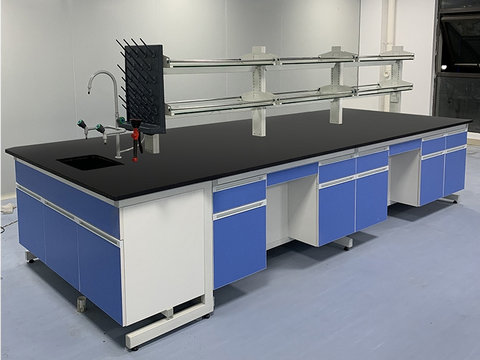Phenolic resin countertops are made by saturating multiple layers of kraft paper with phenolic resin. The layers are then compressed under high pressure and temperature, fusing them into a solid, durable surface. Phenolic resin is a synthetic polymer formed by the reaction of phenol and formaldehyde, which gives the countertop its unique properties.

Advantages
Application of phenolic boards in Fume Hoods
Chemical Resistance
- They can withstand exposure to a wide range of chemicals, including acids, bases, and solvents. This makes them ideal for use in laboratories, chemical processing plants, and other environments where chemical spills are common. For example, in a chemistry lab, a phenolic resin worktop can resist damage from accidental spills of hydrochloric acid or sodium hydroxide.
Heat Resistance
- Phenolic resin laminate have good heat – resistance capabilities. They can typically withstand temperatures up to 150 – 180°C (302 – 356°F) without significant damage. This allows them to be used in areas where hot equipment or substances may be placed, such as near stoves or in industrial settings with heating processes.
Durability
- These HPL worktops are highly durable and resistant to scratches, impacts, and wear. The high – pressure manufacturing process results in a dense and hard surface that can withstand the rigors of daily use. In a busy commercial workshop, phenolic resin desk tops can maintain their appearance and functionality for a long time.
Hygiene
- The smooth and non – porous surface of phenolic resin benchtop is easy to clean and disinfect. It does not absorb moisture, bacteria, or stains easily, which helps to maintain a hygienic environment. This is particularly important in food preparation areas, hospitals, and laboratories.
Cost – effective
- Compared to some other high performance countertop materials like granite or quartz, chemical resistant laminates are often more affordable. They offer a good balance of performance and cost, making them a popular choice for budget – conscious projects.
Disadvantages
Phenolic Sheets With Quality And Good Price For School Laboratory
Aesthetics
- While phenolic countertops are available in a variety of colors, they may not have the same natural beauty and high – end appearance as materials like marble or granite. The colors can sometimes appear a bit artificial, and they may not provide the same luxurious look for high – end residential or commercial spaces.
Limited Design Options
- The design flexibility of phenolic resin worktops is relatively limited compared to other materials. They are usually available in standard sizes and shapes, and it can be challenging to create custom – made or intricate designs.
Vulnerability to Deep Scratches
- Although they are resistant to normal scratches, very sharp or heavy – duty objects can cause deep scratches on the surface. Once a deep scratch occurs, it can be difficult to repair and may affect the overall appearance and functionality of the countertop.
Applications
Laboratories
- As mentioned earlier, due to their excellent chemical and heat resistance, phenolic worktops are widely used in chemical, biological, and medical laboratories. They provide a safe and reliable surface for conducting experiments, handling chemicals, and using laboratory equipment.
Industrial Workshops
- In industrial settings such as manufacturing plants, machine shops, and electronics factories, phenolic tops can withstand the harsh conditions of industrial operations. They can resist damage from tools, chemicals, and mechanical impacts.
Educational Institutions
- Schools and universities use phenolic resin benchtops in their science labs and classrooms. They are suitable for teaching students about chemistry and other scientific disciplines, as they can endure the rough handling and chemical exposure associated with student experiments.
